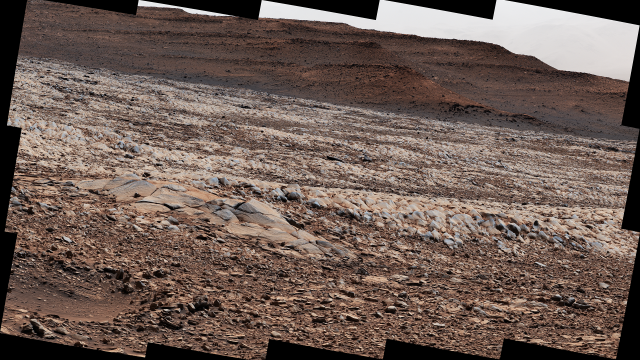Forgot all about Curiosity, didn’t you? The veteran Mars rover spent most of last month climbing a gentle slope known as the Greenheugh Pediment, but now it has to turn back after encountering sharp rocks that could damage its wheels.
Though recently overshadowed by the brand-spanking-new Perseverance rover, which is studying a dried up crater lake for signs of fossilized microbial life, the Curiosity rover is still very much alive and well on the Red Planet. Curiosity is studying geology on a lofty Martian mountaintop, which is how it came across the interesting (albeit bothersome) rock formation.
The rocks are sandstone ventifacts — stones sharpened by years and years of wind-driven erosion — and are nicknamed ‘gator back’ rocks for their resemblance to the Earth reptile’s bumpy dorsal side. Curiosity encountered them on March 18 on the pediment’s south side, atop the 5 km-tall Mount Sharp that the rover has been climbing since 2014. (In the winter, the rover captured some arresting images from its lofty outpost.)
“From a distance, we can see car-sized boulders that were transported down from higher levels of Mount Sharp – maybe by water relatively late in Mars’ wet era,” said Ashwin Vasavada, Curiosity’s project scientist at NASA’s Jet Propulsion Laboratory, in a NASA release. “We don’t really know what they are, so we wanted to see them up close.”
According to NASA, the rocks aren’t impassable but would considerably weather Curiosity’s wheels. The Curiosity team decided traversing the stones wasn’t worth it. Instead, the next couple of weeks will see the rover descend the Greenheugh Pediment to an area covered with clay and sulfates. On a more ancient Mars, the region featured streams and ponds, which dried up as the Martian climate changed. (The same reason that Perseverance’s Jezero Crater is no longer a massive lake).
“It was really cool to see rocks that preserved a time when lakes were drying up and being replaced by streams and dry sand dunes,” said Abigail Fraeman, Curiosity’s deputy project scientist, in the release. “I’m really curious to see what we find as we continue to climb on this alternate route.”
Though Curiosity persists — it’s now been roving Mars for nearly a decade — it is showing signs of wear, part of the reason the team backed down from the gator back rocks. The rover’s robotic arms have braking mechanisms which have stopped working, though the machine is still able to drill rock samples. On a dry planet long devoid of water, the Martian stones are both the boon and bane of scientific operations.
More: NASA and ESA Change Plans for Ambitious Mars Sample Return Mission
